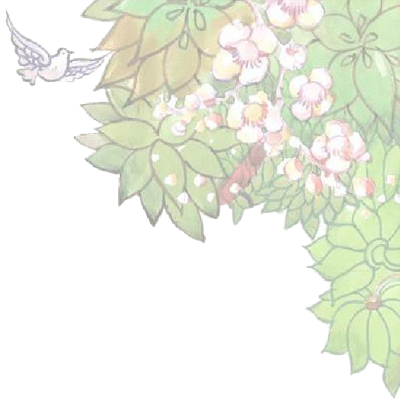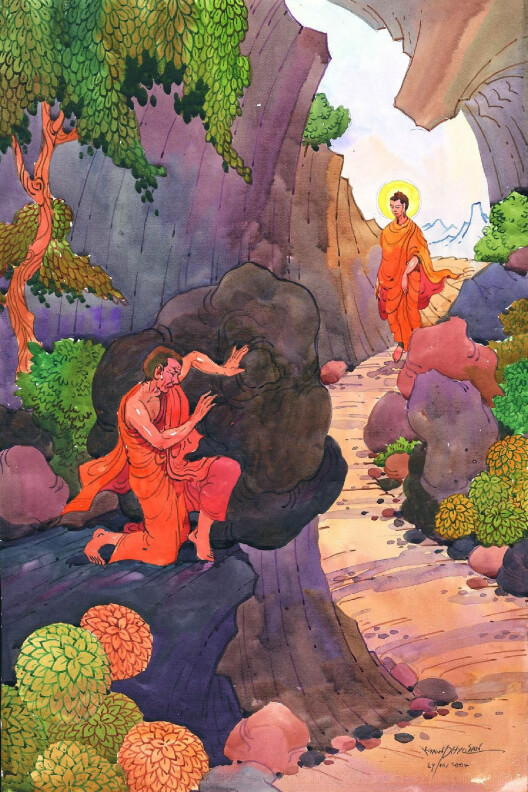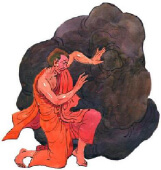62話 デーヴァダッタ ・・・・ 殺仏・破僧のたくらみ

第5部 さまざまな「悪」
第5章 サンガ分裂の陰謀
62話 デーヴァダッタ ・・・・ 殺仏・破僧のたくらみ

デーヴァダッタは、スッパブッダ王とアミター妃の子で、シッダッタ王子の妻ヤソーダラー妃の兄であった。こどもの時代には、シッダッタ王子の遊び友だちの一人で、シッダッタ王子が世を捨ててブッダになられた後、デーヴァダッタは、ほかの釈迦族の王家の青年たち、バッディヤ、アヌルッダ、アーナンダ、バグ、キンビラとともに比丘僧団に入った。
世尊のもとで入団戒を受けた、こうした釈迦族の王家の青年たちのなかでは、バッディヤ尊者が、かれの最初の雨安居中に三明智(訳注:宿住智、死生智または天眼智、漏尽智)に達して阿羅漢となった。アヌルッダ尊者は天眼智(ディッバチャックニャーナ)を得て、「偉大なる思考経(マハーヴィタッカスッタ)」(訳注:増支部「アヌルッダ経」より。少欲・知足・遠離・精進・念・定・智慧・無為の、いわゆる「八大人覚」の教え)の説法をきいて阿羅漢となった。アーナンダ尊者は、プンナ・マンターニプッタ尊者から「アーナンダ経」(訳注:相応部・蘊相応・第9章長老の章。プンナ・マンターニプッタは「説法第一」といわれた)の説法をきいて預流果に達した。バグ尊者とキンビラ尊者は、洞察冥想(ヴィパッサナー)の修習を深めて阿羅漢に達した。一方、デーヴァダッタは、現世の超能力(凡夫(プトゥッジャニカ)の神通(イッディ))を得たが、ひとりの凡夫のままに、とどまった。
ブッダの伝道布教の三十七年目、そしてブッダが七十二歳のとき、デーヴァダッタはブッダの地位を簒奪しようと企んだ。あるとき、世尊は、デーヴァダッタを含む多数の弟子とともにコーサンビー(訳注:ヴァンサ国の首都)に住まわれていた。在家の信者たちが世尊に礼拝するためにやってきて、世尊と八十大弟子への大量の布施の品々も持ってきた。ところが、かれらはデーヴァダッタには、それらを怠ったのである。
これを見て、デーヴァダッタに、こんな嫉妬心が生じた。
「わたしは比丘である。そして、かれらもまた比丘だ。かれらの多くは王族の血筋だが、わたしもまた、王族の血筋を引いている。しかし、あの人びとは、かれらにだけ敬礼し、大量の品々を布施した。そして、誰もわたしに構わなかった。わたしが、もっと布施を、名誉を、名声を、得ることができるようにするには誰と手を結ぶべきか、誰の信頼を勝ち得ることができるだろうか?」
かれはあれこれ、じっくり考えた。
「あのアジャータサットゥ王子がいるな、ビンビサーラ王の息子の。若くて、まだ人生のさまざまの綾を知らないが、輝かしい栄光の未来がある。かれと手を結んで、信頼を勝ち得たら、そのときには、もっと布施、名誉、名声が得られるだろう」
このように考えて、デーヴァダッタは、寝具をまとめて去った。托鉢の鉢と外衣を持って、ラージャガハ(王舎城)へ出発した。童子の姿に身をやつし、七匹のヘビを両手、両足、首、頭、左肩に巻きつけて飾りたてて、姿を変えた身なりで空から降り立ち、突然、アジャータサットゥ王子の膝の上に腰かけた。王子は驚き、恐れ、困惑した。そのときデーヴァダッタが尋ねた。
「こわいのですか、王子よ?」
ふるえる声で王子が答えた。
「そうだ、わたしはおそろしい。そなたは誰なのか?」
「わたしはデーヴァダッタでございます」
「そなたがデーヴァダッタならば、師よ、それでは、本物のデーヴァダッタとして、そなた自身を見せてみよ」
デーヴァダッタは、たちどころに自分の変装を取り払い、王子の前に立った。かれは黄色い衣を身につけ、托鉢の鉢と外衣を持っていた。アジャータサットゥ王子は、この神通力の離れわざにいたく感心し、デーヴァダッタの熱心な支持者となった。爾来、王子は毎朝毎晩、五百台の荷馬車を従えてデーヴァダッタに伺候した。王子はまた、調理した食べ物五百釜も提供した。いまやデーヴァダッタは、かれの望みどおり、布施、名誉と名声に埋もれたのである。しかし、このことによって、こんな邪悪な望みにとりつかれてしまった。
「わたしが、比丘僧団の指導者になってやるぞ」
そして、この邪悪な望みがかれに生じるやいなや、かれの神通力は消えてしまった。
世尊が御心のままの期間、コーサンビーに滞在された後、ラージャガハへ向かわれ、ヴェールヴァナ僧院(竹林精舎)に住まわれた。多くの比丘が世尊のもとへやってきて、このような報告をした。
「尊師よ、アジャータサットゥ王子は毎朝毎晩、五百台の荷馬車を従えてデーヴァダッタのもとへ伺候に行っております。王子によって、調理した食べ物五百釜も、決まって送られております」
世尊は、こう述べられた。
「比丘たちよ、デーヴァダッタが布施で得た物、名誉と名声を、うらやましく思ってはならない。もしもある男が獰猛な犬に、膀胱の袋を投げつけたとすると、犬はいっそう凶暴になるであろう。まさにちょうどそのように、比丘たちよ、アジャータサットゥ王子が毎朝毎晩、五百台の荷馬車を従えてデーヴァダッタのもとへ伺候し、調理した食べ物五百釜を決まって送っているとしても、デーヴァダッタの健康状態は衰えるはずで、良くなるはずはないのです。
比丘たちよ、バナナの木が実を結ぶと枯れて破滅するように、まさにちょうどそのように、デーヴァダッタの布施、名誉と名声への評判は、かれ自身の破滅へみちびくのです」
ある日、世尊が多大な集まりの真ん中に坐られ、王や民衆に説法されているうちに、デーヴァダッタがかれの席から立ち上がった。上衣を左肩にかけ直し、かれは固く握りしめた両手を挙げて、世尊に対し敬意を示すなかで、こういった。
「尊師よ、世尊はいまや、老いておられます。年は、はるかに高齢で、人生の最期の段階に来ておられます。いまや、世尊は休まれ、現世の至福に安住されますように。比丘僧団を指導される世尊の手を、わたしに引き渡されますように。わたしが比丘僧団を率いてまいります」
「もうよい、デーヴァダッタよ、それはふさわしくない! そなたが比丘僧団を率いる、などという野望を抱いてはならない!」
もう一度、デーヴァダッタは同じ要求をしたが、同じ回答であった。デーヴァダッタが三度目の要求をしたとき、世尊は、こう述べられた。
「デーヴァダッタよ、わたしは比丘僧団を指導する手を、サーリプッタやモッガラーナにすら、引き渡さないのだ。そのわたしが、そなたのような浪費家、唾を食う者(ケーラーサカ)に、指導する手を引き渡すことがあろうか?」
(訳注:「唾を食う者」とは、デーヴァダッタがアジャータサットゥ王子に媚びて取り入るため、王子の唾を飲んだ、といわれることをさす)
この回答を聞いて、デーヴァダッタは、こう思った。
「世尊は、王や多くの民衆の面前で、わたしを、唾を食う者、と罵倒した。世尊は、サーリプッタとモッガラーナだけ称賛したのだ」
このように考えて、腹を立て、不機嫌になった。世尊に敬礼後、デーヴァダッタは右回りしつつ世尊のもとから去った。
そのとき世尊は、比丘たちに、こう語りかけた。
「さて、比丘たちよ、サンガ(僧団)はデーヴァダッタに対しラージャガハにおいて、以下のように発表し、公然弾劾(顕示羯磨(パカーサニーヤカンマ))するように。〈かつてデーヴァダッタのふるまいは一つであった。いまや別のものとなった。今後、かれのすべての身体、口頭の行為は、ひとえにデーヴァダッタみずからが責任を負う。それらは世尊(仏)、法(ダンマ)、僧(サンガ)とは、何のかかわりもないものである〉」
その後、僧団によって事前に公認された上で、サーリプッタ尊者が多数の比丘とともにラージャガハへ行って、デーヴァダッタを弾劾した。それを聞いて、信心がなく、賢明ではない人びとは、こういった。
「これらの比丘は釈迦族の息子たちで、デーヴァダッタの布施、名誉と名声をねたんでいるのだ」
しかし、信心があり、賢明な人びとは、こういったのである。
「これは世尊にとって、ふつうの問題であるわけがない。なぜならデーヴァダッタをラージャガハにおいて弾劾したのだから」
僧団がかれを公然弾劾した、ときいて、デーヴァダッタはアジャータサットゥ王子に近づき、こういった。
「王子よ、人びとは昔、長生きでした。しかし、このごろ、人びとは短命です。あなたもまた、ただの王子のままで死ぬかもしれません。だから、あなたの父上を暗殺して、王になられてはどうですか? そして、わたしは世尊を暗殺して、ブッダになります」
アジャータサットゥ王子は、こう考えた。
「デーヴァダッタ尊者は、偉大で力強い。かれがそのように言ったのには根拠があるにちがいない」
そこで王子は、大腿部に短剣を縛り、恐怖と不安と警戒心にふるえながら、白昼、宮殿の奧へ入って行こうとした。しかし、王の護衛役人らが王子を捕らえた。そして、王子を取り調べると、王子の大腿部に短剣がみつかり、きつく縛ってあった。このため、護衛役人らが尋ねた。
「この短剣で何をされるつもりなのですか、王子さま?」
「わたしは、父を暗殺したいのだ」
「誰があなたさまに、そんなことをそそのかしたのですか?」
「デーヴァダッタ尊者である」
これが発覚して、役人のなかには、王子、デーヴァダッタ、そして比丘たち全員、死に処すべし、という意見をもつものがあった。ほかには、比丘たちに過ちはないのだから死に処すべきではないが、王子とデーヴァダッタは処すべし、という意見の者もあった。にもかかわらず、別の者たちが、王子も、デーヴァダッタも、比丘たちも、死に処すべきではなく、王に問題を報告すべきであり、王の命令に従って処断すべきだ、と主張したのである。
このため、役人たちは、王子をビンビサーラ王のもとへ連れていき、王子の父王暗殺の企てを奏上した。王が役人たちにかれらの意見を尋ねると、かれらはさまざまに異なった意見を表明した。王は、こう述べた。
「世尊と真理と僧団(三宝)と、それは何のかかわりがあるのか? 世尊は、すでにデーヴァダッタに対して、ラージャガハにおいて、公然弾劾を発表されているのではないのか?」
それから王は、王子、デーヴァダッタ、そして比丘たち全員、死に処すべし、という意見を支持した役人たちを解任した。比丘たちに過ちはないのだから死に処すべきではないが、王子とデーヴァダッタは処すべし、という意見の役人たちは降格処分にした。そして、王子もデーヴァダッタも比丘たちも、死に処すべきではなく、王に問題を報告すべきであり、王の命令に従って処断すべきだ、と主張した役人たちは昇格処分としたのである。さらに、ビンビサーラ王はわが子である王子に対して、こう尋ねた。
「そなたはなぜ、わたしを暗殺したい、と思ったのか、王子よ?」
「父王よ、わたしは王位がほしいのです」
「王子よ、そなたが、王位がほしいのなら、王位はそなたのものである」
そして、ただちに、王位をかれに譲り、マガダ国のアジャータサットゥ王として即位させたのであった。
ある日、デーヴァダッタはアジャータサットゥ王のもとへ行き、世尊の命を奪う計画を話した。結局、デーヴァダッタは、こういったのである。
「偉大な王よ、ゴータマ比丘を暗殺するため、わたしのもとへ何人かの者を派遣してください!」
デーヴァダッタの悪だくみに同意して、アジャータサットゥ王は、王の師の指示に従うように、と言い含めて何人かの者をデーヴァダッタのもとへ派遣した。そこでデーヴァダッタは、かれらのうちの一人に、こう命じた。
「行け、友よ! ゴータマ比丘は、これこれのところに、いま住んでいる。かれの命を奪い、この道を通って戻って参れ!」
それから、かれらのうちの二人に、こう命じた。
「そなたら二人はこの道にとどまり、この道に通りかかる男を殺し、あの道を通って戻って参れ!」
このようにデーヴァダッタは、かれらのうちの四人を・・・、八人を・・・、十六人を・・・、それぞれ配置して、この道に通りかかる男らを殺せ、と指示し、別の道を通って戻って参れ、と命じた。
それから、最初に命じられた者は、かれの剣と盾を取り、弓と矢筒を装着して、世尊の住まわれているところへ行った。しかし、かれがそこへ近づいたとき、こわくなり、立ち尽くし、体がこわばってしまった。世尊はかれを見て、やさしく語りかけた。
「友よ、ここへ来なさい! 恐れることはない!」
そこで、かれは剣と盾を脇に置き、弓と矢筒を地面に置いた。かれは、世尊のもとへ近づき、世尊の足もとに額づき、意図した犯罪を告白し、その違反を謝罪した。世尊はかれを許し、次第説法で寛大(施論)、道徳(戒論)、天界(生天論)を教え誡された。そして、感覚的快楽の危険・虚栄・汚染(愛欲不利益論)と、禁欲の恩恵(離欲利益論)について説法された。かれは預流果を確立し、三帰依(仏・法・僧への帰依)をもとめ、その後、世尊は、かれを別の道を通って帰らせた。
そのころ、最初に命じられた者を長いあいだずっと待っていた二人は、待ちくたびれてしまった。かれらは立ち上がって、追いかけて行き、世尊が樹下に坐っているのを見た。かれらは世尊に礼拝し、適切なところに坐った。そこで世尊は、かれらにも次第説法された。その結果、かれらも預流果を確立し、三帰依をもとめた。ふたたび世尊は、かれらを別の道を通って去らせた。同じことが、四人にも、八人にも、十六人にも、起きたのである。
それから、最初に命じられた者がデーヴァダッタのもとへ行って、こういった。
「尊師よ、わたしは世尊の命を奪うことはできません。かの方は偉大で力強い」
「もうよい、友よ、ゴータマ比丘の命を奪わずともよい。わたしが、ゴータマ比丘の命をみずから奪うであろう」
ある日、世尊は鷲峰山(ギッジャクータ パッバタ)の起伏ある山陰のなかを歩かれていた。そこでデーヴァダッタが丘を登り、大きな石を強く投げつけながら、こう考えた。
「わたしはゴータマ比丘の命を、これで奪うであろう」
二つの尖った先を持つ岩が突然、地面から跳ね上がり、投げつけた大きな石をふさいだ。しかし、石の破片がひとつ飛び散り、世尊の足に当たり、血が出た。世尊は見上げて、デーヴァダッタに、こういわれた。
「愚かな男よ、そなたは大いなる悪業をなした。邪心と殺意で、そなたは如来(タターガタ)に出血せしめたのだ」
つづけて世尊は、比丘たちに、こういわれた。
「これが、比丘たちよ、デーヴァダッタの最初の極悪犯罪(無間業)で、邪心と殺意のために、かれは如来(タターガタ)に出血せしめた(出仏身血業(ローヒトゥッパーダカ カンマ))のである」
(訳注:仏道や人倫に逆らう五種類の極悪犯罪-母殺し、父殺し、阿羅漢殺し、出仏身血、破僧-を五逆罪という。犯せば無間地獄に堕ちる。五無間業ともいう)
それから、比丘たちは世尊をひとまずマッダクッチ僧院に運び、世尊は比丘たちに、そこからジーヴァカ医師が治療してくれる「ジーヴァカのマンゴー園」へ連れていくように、と頼んだ。この事件後、多くの比丘が世尊の護衛を志願した。かれらは世尊の香房を取り囲み、歩いて行き来し、大きな物音をたてずに聖典を読誦しながら護衛した。しかし、世尊はそれを断り、こう命じた。
「比丘たちよ、どのような人でもブッダの命を暴力で奪うことはできません。ブッダが大般涅槃(マハーパリニッバーナ)に達するときは、どのような人であれ、暴力によってではないのです。そなたたちのそれぞれの住まいに戻りなさい! もろもろのブッダは、命の安全が他の人間の護衛に依っている、というふうな存在ではないのです」
鷲峰山で世尊の命を奪うことに失敗して、デーヴァダッタは三番目の企てを、ナーラーギリ象をけしかけて襲撃させることで実行した。デーヴァダッタは象使いを説き伏せ、獰猛なナーラーギリ象に大量の酒を与え、世尊がいつも托鉢に行くラージャガハの通りで放したのである。比丘たちが世尊に、引き返すように、と警告したのにもかかわらず、世尊はそれを断った。そして、象が突進してきたとき、世尊は象に対して慈悲の心で満たしたのである。荒々しいナーラーギリ象は穏やかになり、完全におとなしくなってしまった。
民衆は、デーヴァダッタの世尊殺害の陰謀に、とても腹を立てた。民衆は、アジャータサットゥ王に抗議し、こうとがめた。
「この悪辣なデーヴァダッタは、アジャータサットゥ王にビンビサーラ王の命を取るようそそのかした奴で、暗殺者をブッダに送った。大きな石を投げつけたのも奴だ。そして、いまや世尊を殺害するために荒々しいナーラーギリ象をけしかけて放したのだ。なんでまたアジャータサットゥ王は、この悪辣な男と親しくして、師と仰いでいるんだ?」
アジャータサットゥ王は、民衆が非難する声をきいて、デーヴァダッタに決まって送っていた調理した食べ物五百釜を大臣らに、もう送らないように、と指示した。王自身、伺候することをやめた。ラージャガハ市民もまた、日々の托鉢で布施食をデーヴァダッタに、もう布施しなかった。かくして、デーヴァダッタが布施で得る物、名誉と名声は減少し、その一方で、世尊が布施で得る物、名誉と名声は以前にも増して増加したのである。
いまやデーヴァダッタは、より困難な状況のなかでかれの生活をやりくりしなければならなくなったが、それでも世尊を貶めようとする悪意が減りはしなかった。かれは、コーカーリカ、カタモーダカティッサ、カンダデーヴィヤープッタ、サムッダダッタに接近し、聖なる僧団の和合秩序の分裂をもたらすためにかれらの支持をとりつけた。デーヴァダッタは、かれらとともに世尊のもとへ行った。世尊に敬礼した後、かれらは一方の脇に坐った。それからデーヴァダッタが、こういった。
「尊師よ、さまざまなやり方で世尊は比丘たちに、少欲、知足、遠離に徹する、調御、和合、渇愛滅尽に専念、精進、を諭されています。以下は、尊師よ、比丘たちのそうしたありかたに資する五つの要点(五事)です。
(1)比丘はすべて、生涯、林に住むべし。村に住むいかなる比丘も罪とする。
(2)比丘はすべて、生涯、托鉢に行って得た食べ物のみを食べるべし。在家の招待を受けて得られる食べ物を食べたいかなる比丘も罪とする。
(3)比丘はすべて、生涯、糞掃衣を着るべし。在家によって布施された衣を着るいかなる比丘も罪とする。
(4)比丘はすべて、生涯、樹下に住すべし。屋内に住むいかなる比丘も罪とする。
(5)比丘はすべて、生涯、肉と魚を食べるべからず。肉と魚を食べるいかなる比丘も罪とする。」
「もうよい、デーヴァダッタ! 林住したいと望む比丘には、そうさせよ。托鉢に行って得た食べ物のみを食べたいと望む比丘には、そうさせよ。糞掃衣のみを着たいと望む比丘には、そうさせよ。在家によって布施された衣を着たいと望む比丘には、そうさせよ。わたしは比丘たちに樹下に八か月住することを許したが、雨期のあいだは許さなかった。わたしは比丘たちに、三つの面で清浄な肉と魚を食べることを許した。すなわち、それらが、かれらの食べ物とするために殺されたことを、見たり、聞いたり、疑わせたり、しないものである」
この五つの要点の要求に応じるのを世尊が断ったとき、デーヴァダッタは喜んだ。それから、デーヴァダッタは追従者とともに立ち上がった。世尊に敬礼後、かれは去った。
デーヴァダッタらはラージャガハへ向かい、世尊が聖なる修行生活に資する五事を拒絶した、というニュースを人びとに流した。そして、デーヴァダッタと追従者たちは五事を遵守する、と告げたのである。
信心がなく、賢明ではない人びとは、デーヴァダッタを称賛し、世尊を非難した。しかし、信心があり、賢明な人びとは、分裂を画策し、サンガ(僧団)の和合を破ろうとしているデーヴァダッタを糾弾した。そして、この件を世尊に報告した。
その後すぐに、世尊はサンガの集会を招集し、デーヴァダッタに、こう尋ねた。
「デーヴァダッタよ、そなたは、分裂を画策(破僧業(サンガベーダカ カンマ))し、サンガの和合を破ろうとしている、というのは、ほんとうか?」
「はい、ほんとうです、尊師よ」
「もうよい、デーヴァダッタ! 分裂を画策し、サンガの和合を破ろうとしてはならない。サンガの分裂を起こす者は、一劫すべてにつづく悪果をともなう悪業を犯すのだ。その者は一劫すべて、地獄で苦しむのだ。しかし、デーヴァダッタよ、すでに分裂したサンガを再結合させた者は善業を積み、一劫すべてにつづく天の至福を楽しむのである。デーヴァダッタよ、サンガの分裂を画策してはならない! まさにそれは、とても重大な責任である」
翌朝、アーナンダ尊者がラージャガハへ托鉢に出かけているとき、デーヴァダッタが尊者を見た。尊者のもとへ行き、こういった。
「友、アーナンダよ、きょうから始めて、わたしは布薩(ウポーサタ)の儀式と、世尊抜きのサンガの行事(僧伽羯磨(サンガカンマ))をするであろう」
帰るなり、アーナンダ尊者がこのことを世尊に語ると、そのとき、世尊は次の偈を口にされた。
「善人は善行為をしやすい。
悪人は善行為をしがたい。
悪人は悪行為をしやすい。
善人は悪行為をしがたい。 」 ・・・ウダーナ(自説) 第5章 第8経より
それから、布薩の日になって、比丘たちの集会の中で、デーヴァダッタが、五事は世尊によって拒絶されたが、デーヴァダッタと追従者たちは五事を遵守する、と述べた。デーヴァダッタは、こう語って、投票を実施したのである。
「この五事に賛同するいかなる比丘も、投票券を取ってください」
そのころ、新比丘五百人がいて、ヴェーサーリーからやってきたヴァッジ族の息子たちであった。かれらは律(ヴィナヤ)について、実のところ無知であった。しかし、それが法(ダンマ)で、律(ヴィナヤ)で、世尊の教えである、と考えて、投票券を取ったのであった。サンガの分裂をひき起こし、デーヴァダッタは比丘五百人とともにガヤーシーサ(象頭山)へ去った。
デーヴァダッタがサンガの分裂(破僧業)をひき起こした、ときかれて、世尊はサーリプッタ尊者とマハーモッガラーナ尊者をガヤーシーサに送り出した。デーヴァダッタは、かれの追従者たちの中央で説教しながら坐っていたが、二人の長老がやってきたのを見て、歓迎した。デーヴァダッタは、コーカーリカが警告して進言したのを無視して、長老二人が自分のもとへ参加しにやってきたのだ、と思い込んだのである。
比丘たちに夜の長いあいだ説法したので、デーヴァダッタは疲れを感じ、休息したかったのだ。サーリプッタ尊者に、会衆に法話をするよう頼んだ。そこで、サーリプッタ尊者は、心を読み取る神変(説示神変(アーデーサナーパーティハーリヤ))を比丘たちに使いながら、忠告し、教誡した。マハーモッガラーナ尊者は、超自然能力の神変(神通神変(イッディ パーティハーリヤ))を比丘たちに使いながら、忠告し、教誡した。無垢で清らかな真理の姿が、比丘たちの内に生じた。
「すべて生じる性質のものは、滅する性質のものである」
かくして、五百人の新比丘たちは預流果に達した。それから長老たちが、かれらをヴェールヴァナ僧院(竹林精舎)へ連れて帰った。
長老二人が五百人の比丘たちと去ってしまった後、デーヴァダッタの胸をコーカーリカが蹴ってたたき起こし、新事態を知らせた。何が起きたのか、デーヴァダッタがさとったとき、熱い血が口からほとばしり出た。九か月のあいだ、かれは重い病で臥せった。
デーヴァダッタは、九か月後のある日、世尊に会いたい、と望んだ。弟子たちに、自分を世尊のもとへ連れて行くように、と懇願した。弟子たちは、デーヴァダッタを寝台に載せたまま、世尊がそのころ住まわれていたサーヴァッティのジェータヴァナ僧院(祇園精舎)へ連れて行った。ジェータヴァナ僧院に到着するなり、デーヴァダッタは水浴びしたいと望み、弟子たちに、池のほとりのあたりに止まるように、と頼んだ。しかし、かれが地面に足を置くやいなや、ぱっくり大地が裂けて口を開き、そこに呑み込まれ、阿鼻(アーヴィチ)地獄(無間地獄)に堕ち、十万劫のあいだ、とどまることとなった。
(訳注:阿鼻地獄とは、八大地獄の最下層で、欲界の最底辺。五逆罪を犯した者がこの地獄に堕ち、間断なく苦しみもがくという)
※ 画像やテキストの無断使用はご遠慮ください。/ All rights reserved.

Episode 62 DEVADATTA, THE WICKED COUSIN
Devadatta was the son of King Suppabuddha and Princess Amitā, and he was the elder brother of Princess Yasodharā, the wife of Prince Siddhattha. In his childhood, he was one of the playmates of Prince Siddhattha. After Prince Siddhattha had renounced the world and became a Buddha, Devadatta entered the Order of Bhikkhus together with the other Sākyan princesBhaddiya, Anuruddha, Ānanda, Bhagu and Kimbila.
Among those Sākyan princes who obtained their higher ordination under the Blessed One, the Venerable Bhaddiya attained the threefold supramundane knowledge and became an Arahant during his first rains-residence; the Venerable Anuruddha gained the Divine Eye (Dibba Cakkhu), and after hearing the Mahāvitakka Sutta he attained Arahantship; the Venerable Ānanda attained the Sotāpatti Phala after hearing the Ānanda Sutta preached by the Venerable Puṇṇa Mantāniputta;
the Venerable Bhagu and the Venerable Kimbila developed insight meditation and attained Arahantship. Devadatta, in the meantime, gained mundane psychic powers (puthujjanika iddhi) remaining as a worldling (puthujjana).
It was the thirty-seventh year of the Buddha’s ministry and when the Buddha was seventy-two years old that Devadatta made his attempt to usurp the Buddha’s place. At one time, the Blessed One was residing in Kosambī together with His many disciples, including Devadatta. The lay devotees came to the monastery to pay respect to the Blessed One and they also brought with them abundant offerings for the Blessed One and His eighty great disciples, but they neglected Devadatta.
Seeing this, such a jealous thought arose in Devadatta: “I am a bhikkhu, and they are also bhikkhus. Many of them are of the Khattiya lineage; I also come from the Khattiya lineage. But, these people pay respect and give abundant offerings only to them, and no one cares about me. Whom should I associate with, whose confidence I can win over, thereby enabling me to acquire much gain, honour and fame?” He
pondered again: “There is this Prince Ajātasattu, son of King Bimbisāra, who is young and still ignorant of many aspects of life, but is with glorious future. Suppose I should associate with him and win over his confidence, then I would also acquire much gain, honour and fame.”
So thinking, Devadatta packed his bed away. He took his alms-bowl and outer robe and set out for Rājagaha. He assumed the form of a youth and adorned himself with seven snakes which wound around his legs, arms, neck, head and left shoulder, and in that guise he came down from the sky and suddenly sat on the lap of Prince Ajātasattu. The prince was shocked, scared and worried. Devadatta then asked: “Are you scared of me, prince?”
The prince replied in a trembling voice: “Yes, I am scared. Who are you?”
“I am Devadatta.”
“If you are Devadatta, good sir, then show yourself as the real Devadatta.”
Devadatta forthwith removed his guise and stood before the prince. He
was dressed in a yellow robe, bringing with him his outer robe and alms-bowl. Prince Ajātasattu was much impressed by this feat of supernormal power and became Devadatta’s devoted follower. Thenceforward, the prince attended on Devadatta every morning and evening with five hundred chariots; he also offered five hundred pots
of cooked food. Now, Devadatta was overwhelmed with offerings, respect and fame, exactly as he wished for. But because of this, he was obsessed by an evil desire: “I will lead the Saṁgha of Bhikkhus.” And as soon as this evil desire arose in him, his supernormal power vanished.
After the Blessed One had stayed at Kosambī as long as He chose, He left for Rājagaha and lived in the Veḷuvana Monastery. A number of bhikkhus came to Him and reported: “Lord, Prince Ajātasattu goes to attend on Devadatta every morning and evening with five hundred chariots. Five hundred pots of cooked food are sent regularly to him by the prince.”
The Blessed One said: “Bhikkhus, do not begrudge Devadatta his gain, honour and fame. Just as a man were to throw a bladder at a fierce dog’s nose, the dog would become more violent. Even so, bhikkhus, for as long as Prince Ajātasattu goes to attend on Devadatta every morning and evening with five hundred chariots and sends five hundred pots of cooked food regularly, so long may Devadatta’s wholesome states be expected to diminish, not to increase.”
“Bhikkhus, just as a banana tree bears its fruit for its own destruction, even so Devadatta’s reputation for gain, honour and fame will lead to his own destruction.”
One day, while the Blessed One was seated amidst a huge gathering preaching the Dhamma to the king and the people, Devadatta rose from his seat. Arranging his upper robe over the left shoulder, he raised up his clasped hands in respect to the Blessed One and said: “Lord, the Blessed One is now old, far advanced in age and have come to the last stage of life. Let the Blessed One now rest and dwell in bliss in
the present life. Let Him hand over the Saṁgha of Bhikkhus to me. I will lead the Saṁgha of Bhikkhus.”
“Enough, Devadatta, it is not proper! Do not aspire to lead the Saṁgha of Bhikkhus!”
For the second time, Devadatta made the same request and received the same answer. When Devadatta made the request for the third time, the Blessed One said: “Devadatta, I would not hand over the Saṁgha of Bhikkhus even to Sāriputta and Moggallāna. How could I hand it over to such a squanderer, eater of spittle (kheḷāsaka), as you?”
Hearing this answer, he thought: “The Blessed One has rebuked me in front of the king and many people as an eater of spittle. He praised Sāriputta and Moggallāna only.” So thinking, he felt aggrieved and displeased. After paying respect to the Blessed One, he departed, keeping Him on his right.
Then, the Blessed One addressed the bhikkhus: “Now, bhikkhus, let the Saṁgha carry out an act of public denunciation (pakāsanīya kamma) against Devadatta in Rājagaha, announcing: ‘Formerly, Devadatta’s conduct was one kind; now he has another. Henceforth, for all his physical and verbal actions, only Devadatta himself is to be held responsible; they have nothing to do with the Blessed One, the Dhamma
and the Saṁgha.’”
Afterwards, the Venerable Sāriputta, formally authorised by the Saṁgha, went into Rājagaha accompanied by a number of bhikkhus and denounced Devadatta. On hearing this, people who lacked faith and were unwise said: “These bhikkhus, son of the Sākyans, are jealous of Devadatta’s gain, honour and fame.” But those who were faithful and wise said: “This cannot be an ordinary matter for the Blessed One to
have Devadatta denounced in Rājagaha.”
Having heard that the Saṁgha made an act of public denunciation on him, Devadatta approached Prince Ajātasattu, saying: “Prince, in ancient times, people were long-lived, but nowadays people are short-lived. You may die also while you are still only a prince. So, why do you not assassinate your father and become king? And I shall assassinate the Blessed One and become a Buddha.”
Prince Ajātasattu thought: “The Venerable Devadatta is mighty and powerful; he should have reasons to say so.” Then, he tied a dagger to his thigh, and in broad daylight, shaking with fear, anxious and suspicious, he tried to enter the inner palace. But, the officers who guarded the king saw him and arrested the prince. And when they examined him, they found a dagger fastened to his thigh. So, they asked: “What do you intend to do with this dagger, prince?”
“I wanted to assassinate my father.”
“Who has instigated you to do this?”
“The Venerable Devadatta.”
Finding this, some officers held the opinion that the prince, Devadatta and all the bhikkhus should be put to death. Some others were of the opinion that the bhikkhus should not be put to death as they did no mistake, but that the prince and Devadatta should. Still, others maintained that neither the prince, Devadatta, nor the bhikkhus should be put to death, but that the matter should be reported to the
king, and action should be carried out according to the king’s orders.
Then, the officers took the prince to King Bimbisāra and informed him of the prince’s attempt to assassinate him. When the king asked them about their opinion, they expressed their different opinions. The king said: “What does the Blessed One, the Dhamma or the Saṁgha have to do with it? Has not the Blessed One already declared an act of public denunciation against Devadatta in Rājagaha?”
Then, the king dismissed the officers who held the opinion that the prince, Devadatta and all the bhikkhus should be put to death. He demoted the officers who were of the opinion that the bhikkhus should not be put to death as they did no mistake, but that the prince and Devadatta should. And he promoted the officers who maintained that neither the prince, Devadatta, nor the bhikkhus should be put to
death, but that the matter should be reported to the king, and action should be carried out according to the king’s orders. Then, King Bimbisāra asked his prince son: “Why do you want to assassinate me, prince?”
“Royal Father, I want the kingdom.”
“Prince, if you want the kingdom, then it is yours,” and he forthwith handed over his kingdom to him and crowned Prince Ajātasattu as king of Magadha.
One day, Devadatta went to King Ajātasattu and mentioned his plan to take the Blessed One’s life. In conclusion, he said: “Great king, send some men for me to assassinate the bhikkhu Gotama!”
Having agreed with Devadatta’s scheme, King Ajātasattu sent some men to Devadatta telling them to follow the instructions of his teacher. Then, Devadatta told one of them: “Go, friend! The bhikkhu Gotama is residing in such and such a place. Take His life and return by this path!” Then he told two men: “You two stay in this path and kill the man who will be coming along by this path, and return by that path!” Thus he placed four men…eight men…sixteen men, and instructed them to
kill the men coming along by this path, and to return by another path.
Then, the first man, having taken his sword and shield and fixed his bow and quiver, went to where the Blessed One was residing. But, when he came closer, he was terrified and stood still; his body became rigid. The Blessed One saw him and spoke to him kindly: “Friend, come here! Do not be afraid!” The man then laid aside his sword and shield as well as his bow and quiver on the ground. He approached the Blessed One, paid obeisance with his head at His feet, confessed his intended
crime and apologised for his transgression. The Blessed One forgave him and expounded progressive talks on generosity, on morality, on the heavens; and He explained the dangers, the vanity and the defilement in sensual pleasures and the blessings in renunciation. The man was established in the Fruition of Sotāpatti and sought refuge in the Triple Refuge, and afterwards the Blessed One sent him back by a
different path.
Then, the two men who had been waiting for the first man for a long time became tired. They got up, followed the path and saw the Blessed One sitting at the foot of a tree. Having paid respect to the Blessed One, they sat down at a suitable place. The Blessed One then gave them progressive talks of the Dhamma. As a result, they were established in the Fruition of Sotāpatti and sought refuge in the Triple Refuge. Again, the Blessed One dismissed them by a different path. The same thing happened with the four, the eight and the sixteen men.
Then, the first man went to Devadatta and said: “Venerable sir, I cannot take the life of the Blessed One. He is very mighty and powerful.”
“Enough, friend, do not take the life of the bhikkhu Gotama. I shall take the life of the bhikkhu Gotama by myself.”
One day, the Blessed One was walking up and down in the shade of the Vulture Peak Rock (Gijjhakūṭa Pabbata). Then, Devadatta climbed up the hill and hurled down a huge stone, thinking: “I shall take the life of the bhikkhu Gotama with this.” Two peaks of rock suddenly sprang up from the ground and blocked the huge stone; but a splinter from it flew off and struck the Blessed One’s foot, causing bloodshed. The
Blessed One looked up and said to Devadatta: “Foolish man, you have made much demerit; for with evil mind and murderous intention, you have caused the bloodshed of the Tathāgata.”
Subsequently the Blessed One said to the bhikkhus: “This, bhikkhus, is Devadatta’s first heinous crime (ānantariya kamma), for with evil mind and murderous intention, he has caused the bloodshed of the Tathāgata (lohituppādaka-kamma).”
Then, the bhikkhus carried the Blessed One to the monastery in Maddakucchi, and from there the Blessed One asked the bhikkhus to take Him to Jīvakambavana, where the physician Jīvaka attended on Him. After this event, many bhikkhus wished to give protection to the Blessed One. They surrounded the Blessed One’s chamber, walking up and down, and reciting the scriptures without realising that they made a
loud noise. But, the Blessed One refused it and summoned the bhikkhus, saying: “Bhikkhus, it is impossible for any person to take the life of the Buddhas by violence. When the Buddhas attain Mahāparinibbāna, it is not through violence caused by any person or another. Go back to your own dwellings! The Buddhas are not beings whose security of Their lives depends only on other people’s protection.”
Having failed to take the life of the Blessed One at the Gijjhakūṭa Hill, Devadatta made his third attempt by causing the elephant Nāḷāgiri to attack Him. He persuaded the mahout to give much liquor to the vicious elephant Nāḷāgiri and let it loose on the street of Rājagaha where the Blessed One usually went for alms. Although the
Blessed One was warned by the bhikkhus to turn back, He refused it. And as the elephant advanced, the Blessed One suffused loving-kindness to it. The fierce elephant Nāḷāgiri became calm and was completely subdued.
People were much annoyed by Devadatta’s plot to assassinate the Blessed One. They protested and blamed King Ajātasattu: “This wicked Devadatta, who instigated the king to take the life of King Bimbisārait was Devadatta who sent the assassins; it was he who hurled down the huge rock; and now he sent the fierce elephant Nāḷāgiri to
assassinate the Blessed One. How can King Ajātasattu be associated with this wicked man and make him his teacher?”
King Ajātasattu, having heard his people reproaching him, instructed his ministers not to send regular offerings of five hundred cooked foods to Devadatta anymore. He himself stopped visiting him. The citizens of Rājagaha also did not offer alms-food anymore to Devadatta on his daily alms-round. Thus, Devadatta’s gain, honour and fame declined, while the Blessed One’s gain, honour and fame increased even more.
Although now Devadatta had to manage his life in a more difficult condition, it did not lessen his evil intention to disparage the Blessed One. He approached Kokālika, Kaṭamodakatissaka, Khaṇḍadeviyāputta and Samuddadatta and won over their support in bringing about a schism in the Holy Order. Devadatta went together
with them to the Blessed One. After paying homage to Him, they sat down at one side. Devadatta then said: “Lord, the Blessed One has in many ways instructed the bhikkhus to have few wishes, to be contented, devoted to effacement, scrupulous, amiable, given to diminution of craving, and energetic. These, Lord, are five points conducive to those states for bhikkhus:
(1) All bhikkhus should be forest dwellers for life. Should any bhikkhu live in a village, he is guilty of an offfence.
(2) All bhikkhus should eat only food obtained by going on alms-round for life. Should any bhikkhu eat food obtained from accepting householders’ invitation, he is guilty of an offfence.
(3) All bhikkhus should wear only robes made from pieces of cloth collected from rubbish heaps for life. Should any bhikkhu wear a robe offered by householders, he is guilty of an offfence.
(4) All bhikkhus should only dwell at the foot of trees for life. Should any bhikkhu dwell in a building with a roof, he is guilty of an offfence.
(5) All bhikkhus should not eat meat and fish for life. Should any bhikkhu eat meat and fish, he is guilty of an offfence.”
“Enough, Devadatta! Let the bhikkhu who so wishes be a forest dweller; let the bhikkhu who so wishes dwell in a village. Let the bhikkhu who so wishes eat only food obtained by going on alms-round; let the bhikkhu who so wishes eat the food obtained from accepting householders’ invitation. Let the bhikkhu who so wishes wear only a robe made from pieces of cloth collected from rubbish heaps; let the
bhikkhu who so wishes wear a robe offered by householders. I have allowed bhikkhus to dwell at the foot of trees for eight months, but not during the rains. I have allowed bhikkhus to eat meat and fish which are pure in three aspects, that is, they not seen or heard or suspected to have been killed for their food.”
Devadatta was delighted when the Blessed One refused to comply with his five requests. Then, he got up together with his followers. After paying homage to the Blessed One, he departed. They made their way into Rājagaha and spread the news to the people that the Blessed One had rejected the five points conducive to holy life, and said that Devadatta and his followers observed them.
Those people who lacked faith and were unwise praised Devadatta and blamed the Blessed One. But those who were faithful and wise condemned Devadatta for trying to create a schism and a breach of concord in the Saṁgha, and they reported this matter to the Blessed One.
Thereupon, the Blessed One called a Saṁgha meeting and asked Devadatta: “Devadatta, is it true that you are trying to create a schism (saṁghabhedaka-kamma) and a breach of concord in the Saṁgha?”
“Yes, it is true, Lord.”
“Enough, Devadatta! Do not try to create a schism and a breach of concord in the Saṁgha. One who causes a schism in the Saṁgha commits an evil deed with evil consequences lasting for one whole aeon. He will suffer in hell for one whole aeon. But, Devadatta, one who reunites the Saṁgha already split commits a good deed and enjoys heavenly bliss lasting for one whole aeon. Devadatta, do not try to create a schism in the Saṁgha! Indeed, it is a very grave responsibility.”
The next morning, when the Venerable Ānanda was going for alms-round
in Rājagaha, Devadatta saw him. He went up to him and said: “Friend Ānanda, starting from today I shall perform the Uposatha (Sabbath day) service and the acts of the Saṁgha (Saṁghakamma) without the Blessed One and the Saṁgha of Bhikkhus.”
On his return, the Venerable Ānanda related this to the Blessed One, who then uttered a stanza:
“It is easy for a good man to do a good deed.
It is hard for an evil man to do a good deed.
It is easy for an evil man to do an evil deed.
It is hard for a good man to do an evil deed.”
Then, on the Uposatha day, in middle of the assembly of bhikkhus, Devadatta mentioned the five points that were rejected by the Blessed One, but observed by him and his followers. He held a ballot, saying: “Let any bhikkhu in favour of these five points take a voting ticket.” At that time, there were five hundred new bhikkhus from Vesālī, sons of the Vajjians. They were actually ignorant of the Discipline (Vinaya) rules. But, thinking that it was the Dhamma, it was the Vinaya and it was the Master’s Teaching, they took the voting tickets. Having created a schism in the Saṁgha, Devadatta left for Gayāsīsa together with the five hundred bhikkhus.
Hearing that Devadatta had created a schism (saṁghabhedaka-kamma), the Blessed One sent the Venerable Sāriputta and the Venerable Moggallāna to Gayāsīsa. Devadatta, who was seated preaching in the midst of his followers, saw the two elders coming and welcomed them. Devadatta, neglecting the warning posed by Kokālika, believed that the two elders had come to join him.
Having preached to the bhikkhus for much of the night, Devadatta felt tired and wished to rest; he asked the Venerable Sāriputta to address the assembly. Then, the Venerable Sāriputta advised and admonished the bhikkhus with a talk on the Dhamma using the marvel of reading minds (ādesanāpāṭihāriya); the Venerable Moggallāna advised and admonished them with talk on the Dhamma using the marvel of supernormal powers (iddhipāṭihāriya). The spotless and immaculate vision of the Dhamma arose in them: “All that is subject to arising is subject to cessation.” Thus, the five hundred new bhikkhus attained the Fruition of Sotāpatti. Then, the elders took them back to the Veḷuvana Monastery.
After the two elders had gone away with the five hundred bhikkhus, Kokālika woke Devadatta up by kicking him on the chest and told him the news. When Devadatta discovered what had happened, hot blood gushed from his mouth. For nine months, he laid grieviously ill.
One day, after nine months, Devadatta desired to see the Blessed One; he begged his disciples to take him to the Blessed One. His disciples laid him on a couch and carried him to the Jetavana Monastery in Sāvatthi, where the Blessed One was residing. On reaching the Jetavana Monastery, he asked his disciples to stop on the bank of a pond nearby as he desired to take a bath. But, as soon as he stepped his feet down on the ground, the earth cracked open, and he was swallowed up and
engulfed in the Avīci Hell, where he would stay there for one hundred thousand aeons.
※ 画像やテキストの無断使用はご遠慮ください。/ All rights reserved.
アシン・クサラダンマ長老
1966年11月21日、インドネシア中部のジャワ州テマングン生まれ。中国系インドネシア人。テマングンは近くに3000メートル級の山々が聳え、山々に囲まれた小さな町。世界遺産のボロブドゥール寺院やディエン高原など観光地にも2,3時間で行ける比較的涼しい土地という。インドネシア・バンドゥンのパラヤンガン大学経済学部(経営学専攻)卒業後、首都ジャカルタのプラセトエイヤ・モレヤ経済ビジネス・スクールで財政学を修め、修士号を取得して卒業後、2年弱、民間企業勤務。1998年インドネシア・テーラワーダ(上座)仏教サンガで沙弥出家し、見習い僧に。詳しく見る
奥田 昭則
1949年徳島県生まれ。日本テーラワーダ仏教協会会員。東京大学仏文科卒。毎日新聞記者として奈良、広島、神戸の各支局、大阪本社の社会部、学芸部、神戸支局編集委員などを経て大阪本社編集局編集委員。1982年の1年間米国の地方紙で研修遊学。2017年ミャンマーに渡り、比丘出家。詳しく見る

※ 画像やテキストの無断使用はご遠慮ください。
All rights reserved.

